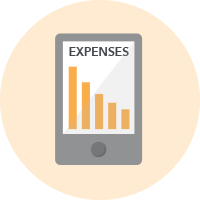Planning your Social Security claiming age
The age you claim Social Security affects your lifetime income. We’ll help you think through this decision.
- English
- Español
The Social Security Administration offers free interpreter services and a multilanguage gateway to help consumers who speak other languages.
Please try a newer browser or confirm that JavaScript is enabled.
Step 1: Explore how the age you start collecting Social Security affects your retirement benefits
Your estimated benefits:
Select claiming ages on the graph to see how your estimated benefit changes.
Claiming at age Age 67 is your full benefit claiming age.
Compared to claiming at your full benefit claiming age.By age 85, an average lifespan, your total benefits will be
(in today's dollars)
Social Security retirement benefits are not designed to be your sole source of retirement income, but waiting even one month will increase your benefits.
About your maximum benefit claiming age:
- Always 70.
- At this age, you will get the maximum possible monthly benefit.
About your full benefit claiming age:
- It is based on the year you were born.
- At this age, you will receive your full benefit with no reductions.
About your early benefit claiming age:
- Earliest age you can claim your benefit is 62.
- If you claim your benefit before your full claiming age, it will be reduced.
Remember, claiming age here refers only to your Social Security retirement benefit, and not when you decide to stop working or apply for Medicare.
Estimated benefits
Claiming age
Step 2: Learn tips specific to your situation
Picture your life in retirement to receive claiming tips.

Are you married?
You can protect the financial security of your surviving spouse.
Your decision of when to claim your Social Security could affect the benefits your spouse will receive after you die. Surviving spouses can keep either their own benefit or choose to keep their spouse's benefit, whichever is higher. If you are married, and are the higher earner in the household, claiming at your full benefit age will ensure your spouse will receive the higher benefit. Talk to your spouse about your claiming options so you can make this important decision together. Learn more about spousal benefits
Claiming at your full retirement age or later permanently increases your benefit.
If you claim at your full Social Security benefit age or later, you will avoid a reduction in your monthly benefit. In addition, if you choose to wait to claim past your full benefit age until age 70, you can get an increase for every month that you wait. If you are divorced, your former spouse's claiming decision will not affect your benefit, so it should not affect your decision of when to claim. Learn more about your Social Security benefits after a divorce
Your claiming age matters for your own retirement benefits and your survivor's benefits.
You may qualify for a survivor benefit if your deceased spouse qualified for Social Security. You can wait until age 70 to claim your survivor benefit and get the maximum amount possible, or you can claim a reduced survivor benefit as early as age 60. You may also qualify for a retirement benefit based on your own earnings record, but you will only receive one benefit at a time. If you expect your own retirement benefit to be higher than the survivor benefit, you may want to consider claiming the survivor benefit first. That way, you can start receiving some money from Social Security as your own retirement benefit continues to grow. Learn more about Social Security survivor benefits

Do you plan to continue working in your 60s?
Working in your 60s will help you maximize your income and savings.
Your benefits are based on your highest 35 years of earnings. Each year of work can add higher earnings to your record by replacing years with low earnings such as those when you were a student, were unemployed, or took time off to care for someone. When you work and wait to claim until age 70, you can increase your monthly benefit by more than 75 percent! Working in your 60s also gives you more time to save on your own for retirement. Review your earnings record on my SocialSecurity .
Working in your 60s will help you maximize your income and savings.
Your benefits are based on your highest 35 years of earnings. Each year of work can add higher earnings to your record by replacing years with low earnings such as those when you were a student, were unemployed, or took time off to care for someone. When you work and wait to claim until age 70, you can increase your monthly benefit by more than 75 percent! Working in your 60s also gives you more time to save on your own for retirement. Review your earnings record on my SocialSecurity .
You can maximize your benefits even if you work fewer hours or stop working.
You may choose to work fewer hours or stop working in your 60s. If you decide to do so, you could use a portion of your retirement savings such as your 401(k) or Individual Retirement Account (IRA) to supplement your income in your early 60s until you reach your full Social Security benefit claiming age. If you can continue working in your 60s, you may add higher earnings to your record, getting you a higher monthly benefit. Remember, your monthly benefit will be significantly higher when you claim at your full benefit age or later. The age at which you decide to stop working doesn't have to be the same as your claiming age. Learn more about working and collecting Social Security benefits .
You can maximize your benefits even if you work fewer hours or stop working.
You may choose to work fewer hours or stop working in your 60s. If you decide to do so, you could use a portion of your retirement savings such as your 401(k) or Individual Retirement Account (IRA) to supplement your income in your early 60s until you reach your full Social Security benefit claiming age. If you can continue working in your 60s, you may add higher earnings to your record, getting you a higher monthly benefit. Remember, your monthly benefit will be significantly higher when you claim at your full benefit age or later. The age at which you decide to stop working doesn't have to be the same as your claiming age. Learn more about working and collecting Social Security benefits .
Consider working in your 60s for an extra boost to your income and savings.
Working in your 60s may increase your monthly benefit in a few ways. Because your benefits are based on your highest 35 years of earnings, each year of work can add higher earnings to your record by replacing years with low earnings, such as those when you were a student, were unemployed, or took time off. When you work and wait to claim until age 70, you can increase your monthly benefit by more than 75 percent! Working in your 60s also gives you more time to save on your own for retirement. Learn more about working and collecting Social Security benefits .
Consider working extra years in your 60s for an extra boost to your income and savings
Working in your 60s may add higher earnings to your record, getting you a higher monthly benefit. Remember, your monthly benefit will be significantly higher when you claim at your full Social Security benefit age or later. If you need to work fewer hours, you could use a portion of your retirement savings such as your 401(k) or Individual Retirement Account (IRA) to supplement your income until full retirement age. However, this may not be an option if it eliminates your savings completely. Learn more about working and collecting Social Security benefits .

Will your expenses decrease after you retire?
Retirement could be more expensive than you expect.
If you're planning an active retirement or carry a mortgage or other debt, retirement may be more expensive than you expect. Some regular expenses like your out-of-pocket health care costs will likely increase as you get older. You can protect your retirement lifestyle by reducing your largest expenses. You can also increase your regular income by claiming at your full Social Security benefit age or later. If you claim earlier, your monthly benefit could be reduced by as much as 30 percent. Create a retirement budget .
Retirement could be more expensive than you expect.
If you're planning an active retirement or carry a mortgage or other debt, retirement may be more expensive than you expect. Some regular expenses like your out-of-pocket health care costs will likely increase as you get older. You can protect your retirement lifestyle by reducing your largest expenses. You can also increase your regular income by claiming at your full Social Security benefit age or later. If you claim earlier, your monthly benefit could be reduced by as much as 30 percent. Create a retirement budget .
Maintain your lifestyle by planning ahead.
Future expenses are difficult to predict. Some regular expenses like out-of-pocket health care costs will likely increase as you get older. You can protect your retirement lifestyle by reducing your largest expenses. Consider downsizing or paying off your mortgage before you retire. You can also increase your regular income by claiming at your full Social Security benefit age or later. If you claim earlier, your monthly benefit could be reduced by as much as 30 percent. Create a retirement budget .
Maintain your lifestyle by planning ahead.
Future expenses are difficult to predict. Some regular expenses like out-of-pocket health care costs will likely increase as you get older. You can protect your retirement lifestyle by reducing your largest expenses. Consider downsizing or paying off your mortgage before you retire. You can also increase your regular income by claiming at your full Social Security benefit age or later. If you claim earlier, your monthly benefit could be reduced by as much as 30 percent. Create a retirement budget .
Many people find retirement is more expensive than expected.
Future expenses are difficult to predict. Some regular expenses like out-of-pocket health care costs will likely increase as you get older. You can protect your retirement lifestyle by reducing your largest expenses. Consider downsizing or paying off your mortgage before you retire. You can also increase your regular income by claiming at your full Social Security benefit age or later. If you claim earlier, your monthly benefit could be reduced by as much as 30 percent. Create a retirement budget .
Many people find retirement is more expensive than expected.
Future expenses are difficult to predict. Some regular expenses like out-of-pocket health care costs will likely increase as you get older. You can protect your retirement lifestyle by reducing your largest expenses. Consider downsizing or paying off your mortgage before you retire. You can also increase your regular income by claiming at your full Social Security benefit age or later. If you claim earlier, your monthly benefit could be reduced by as much as 30 percent. Create a retirement budget .

Do you expect to have additional sources of retirement income beyond Social Security?
Continue saving in the coming years.
Social Security won't replace all of your pre-retirement income. On average, Social Security replaces 40 percent of a worker's income. That means your retirement savings, pension , 401(k) , or Individual Retirement Account (IRA) will need to fill the gap. Claiming at your full Social Security benefit age or later (up to age 70) can minimize this gap and maximize your monthly benefit. If you claim before your full retirement age, your monthly benefit could be reduced by as much as 30 percent. Learn more about saving for retirement .
You have an opportunity to continue growing your money.
If you can, get the highest monthly Social Security benefit possible by claiming at your full Social Security benefit age or later. If you claim before your full retirement age, your monthly benefit could be permanently reduced by as much as 30 percent. Also, take advantage of catch-up contributions to your 401(k) or Individual Retirement Account (IRA) . Lastly, avoid losing your retirement savings to unnecessary tax penalties. If you withdraw your 401(k) or IRA savings before age 59½, you will likely face an early withdrawal penalty. Learn more about how retirement savings grow .
It's a perfect time to start saving.
You could save through your employer's 401(k) or an Individual Retirement Account (IRA) to fill the gap. Maximize an employer match if one is offered. Some employers match the money you put in your 401(k) plan which helps to grow your retirement savings. Even if you're unable to save as much as you'd like, your small savings today will grow over time and can become extra income or emergency savings in the future. If you expect Social Security to be your only source of income, you can still make the most out of it by claiming at your full Social Security benefit age or later. If you claim before your full retirement age, your monthly benefit could be reduced by as much as 30 percent. On the other hand, you can get extra increases for every month that you wait to claim past your full benefit age until age 70. Learn more about how retirement savings grow .
It's never too late to start saving!
You could save through your employer's 401(k) or an Individual Retirement Account (IRA) . Make sure to maximize an employer match if one is offered. Some employers match some of the money you put in your 401(k) plan which helps to grow your retirement savings faster. You can also make additional contributions to these accounts called catch-up contributions . If you expect Social Security to be your only source of income, you can still make the most out of it by waiting to claim at your full Social Security benefit age or later. When you claim before your full retirement age, your monthly benefit could be reduced by as much as 30 percent. Learn more about starting an IRA .
There are many ways to plan for a secure retirement outside of Social Security.
You may be able to save through your employer's 401(k) plan or an Individual Retirement Account (IRA) . Maximize an employer match if one is offered. Some employers match some of the money you put in your 401(k) retirement plan, helping you grow your retirement savings faster. Your decision about when to claim your Social Security benefits is especially important if you cannot or did not save as much as you would like. When you claim at your full Social Security benefit age or later, you avoid a reduction in your monthly benefit. You will also get increases for every month that you wait to claim past your full benefit age until age 70. Learn more about starting an IRA .
It's never too late to start saving!
You may be able to save through your employer's retirement plan or an Individual Retirement Account (IRA ). Maximize an employer match if one is offered. This will help you grow your retirement savings faster. You can also make additional contributions to these accounts called catch-up contributions . Your decision about when to claim your Social Security benefits is especially important if you cannot or did not save as much as you would like. When you claim at your full Social Security benefit age or later, you avoid a reduction in your monthly benefit. You will also get increases for every month that you wait to claim past your full benefit age until age 70. Learn more about working and collecting Social Security benefits .

Do you expect to live a long life?
Many people live longer than they expect.
Because Social Security provides guaranteed income for life, it's especially valuable to you when you reach age 80 and beyond. Claiming benefits at your full Social Security benefit age or later could be a good way to secure your monthly income during your later years. Your benefit increases the longer you wait to claim, up to age 70, and is adjusted annually with the cost of living. If you live into your 80s but claim at age 62 instead of your full retirement age or later, your total lifetime benefits will be lower by thousands of dollars. Calculate your expected longevity .
Claiming at your full benefit age could still make sense for you.
We understand it's difficult to make predictions. You may want to plan for the possibility that you (or your spouse) may spend 20 or more years in retirement. On average, a woman reaching age 65 today will live to age 87, and a man will live to age 84. Waiting to claim as long as you can could still make sense for you if you are married, are the higher earner in the household, and want your surviving spouse to keep the highest monthly benefit after you die. Remember, you can claim at any point between age 62 and 70. Each additional month that you wait to claim gives you a permanent increase in your monthly benefit which becomes more valuable as you age. Calculate your longevity .
There's a good chance that you'll live into your 80s and beyond.
We understand it's difficult to make predictions. You may want to plan for the possibility that you (or your spouse) may spend 20 or more years in retirement. On average, a woman reaching age 65 today will live to age 87, and a man will live to age 84. Claiming benefits at your full Social Security benefit age or later could be a good way to secure your monthly income during your later years. Your monthly benefit increases the longer you wait to claim, up to age 70, and is adjusted annually with the cost of living. If you live into your 80s but claim at age 62 instead of your full retirement age or later, your total lifetime benefits will be lower by thousands of dollars. Calculate your longevity .
Step 3: Learn your next steps
Select the age you plan to start collecting your Social Security retirement benefits.
(This will not affect your Social Security account or eligibility and it will not begin an application.)
You’ve chosen age , which is your maximum Social Security benefit claiming age.
This means you will get your maximum possible monthly benefit! Here are a few things to keep in mind in the next few years.
You’ve chosen age , which is later than your Social Security full retirement claiming age.
This means you will get an increase in your monthly benefits! Here are a few things to keep in mind in the next few years.
You’ve chosen age , which is your Social Security full retirement claiming age.
That means you’ll receive your full benefit with no reductions! Here are a few things to keep in mind in the next few years.
You’ve chosen age , which is earlier than your Social Security full retirement claiming age.
If you start collecting at this age you will receive less than your full benefit amount. Here are a few things to keep in mind in the next few years.
- Create a my Social Security account to review your expected benefits based on your actual Social Security record. You will also find additional information about your eligibility and other benefits including disability and survivor benefits.
- If your income, employment, or marital status changes, you may need to reconsider the age you want to start collecting your benefits. Visit us again!
The Social Security Administration offers free interpreter services and a multilanguage gateway to help consumers who speak other languages.
Legal Disclaimer:
The content on this page provides general consumer information. It is not legal advice or regulatory guidance. The CFPB updates this information periodically. This information may include links or references to third-party resources or content. We do not endorse the third-party or guarantee the accuracy of this third-party information. There may be other resources that also serve your needs.
